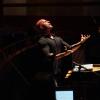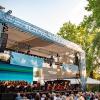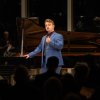Art song recitals are sometimes brushed off as “opera lite"— entertaining, yet not terribly meaty. But Festival Opera's salon program of “American Song Cycles” featuring soprano Carrie Hennessey last weekend was the real thing. Festival Opera brought compelling music, powerfully and theatrically presented, but with a minimum of extraneous trappings. Not “lite” but “lithe” in the best sense of the word: flexible, vital, and in tune with the beating of the heart.
The recital on Sunday, Aug. 24, at the intimate hall of the Piedmont Center for the Arts, was the second of three offerings in Festival Opera's summer “Salon Series.”
Hennessey, a well-known performer in the Bay Area, has a wide range of tonal colors, stupendously clear diction, and impeccable vocal technique. Added to that is her extraordinary stage presence — richly emotional and grippingly dramatic — fully inhabiting the music. She sang the entire afternoon's repertoire from memory — or, one might say, by heart.
The program opened with a trilogy by the American pianist and composer Amy Beach, based on 19th-century French poems. A high point in this set was an appropriately ecstatic rendition of “Ecstasy,” one of Beach’s most famous songs. Hennessey was joined in the recital by the excellent collaborative pianist Daniel Lockert, who deftly delivered Beach’s romantic textures.
Portraits of Disquiet by the young American composer Julia Seeholzer is a dark set of three songs written on the occasion of the first Trump election to texts by a poet known as Kendell A. It began without the piano, in a dazzling solo monologue.
Seeholzer’s cycle was deeply disquieting (as the title warned). It captured much of the social anguish that swelled up in 2016 and still plagues the United States. There were shrieks of terror and passages of militaristic swagger, creating an unflinching depiction of an infernal time. But Hennessey and Lockert also brought out the music’s messages of courage and resistance.
The second half of the recital featured Jake Heggie's 2005 dramatic monologue, At the Statue of Venus— not so much a song cycle as a one-act opera to a libretto by playwright Terrance McNally. It’s an extended thought-bubble stream of consciousness: Rose, the only character, is on a blind date, waiting for “him” to show up; she’s nervous about her outfit (“the slacks were a mistake”), comparing herself to “all those women” on the pedestals and in the paintings. In the end, “he” apparently does arrive (our clue is a single offstage word, “Rose?”) but we don’t find out how the date goes.
Heggie’s buoyant melodiousness brought this funny, self-deprecating, and slightly melancholy character to life, and Hennessey’s impeccable diction and theatrical flair clinched the portrait. The penultimate section, “A Lucky Child,” was especially powerful: In it, Rose finds comfort and strength in reminiscences of her childhood and her loving father and mother — which Heggie has set with echoes of Samuel Barber’s great nostalgic monody, Knoxville: Summer 1915.
The well-attended recital was introduced by Festival Opera General Director Zachary Gordin, who has spearheaded the company’s post-COVID revival with inventive mainstage productions as well as salon recitals and a production of Pagliacci in two East Bay parks, this past June. Kudos to him and his board for keeping one of the Bay Area’s distinctive musical ventures afloat in tough times.
Festival Opera presents one more salon recital this season, featuring local singers Shawnette Sulker and Sara Couden, with Gordin on the piano, Sept. 28. The company will also stage Verdi's La traviata for two performances at the Lesher Center for the Arts in October.




